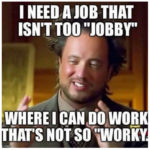“Why do you want this job?”
Oh boy, what a minefield of a question. 😟 Let’s break this down a little to develop the best answer possible to “Why do you want this job?”. Be prepared: this is a deep-dive into how to answer this tough interview question. Scroll down to the template section at the bottom of the page to just see our examples.
What does it mean? 🤔
Often rephrased as “Why did you apply for this role?” or “Tell us why you want to work for us”, this question generally appears early on in the interview.
The question is a way for the interviewer to get to know who you are, how you’d fit into the organisation, and how you will add value to the team or company. So don’t worry that it comes across as quite upfront!
In other words, it’s about saying the reasons why you want the job and why you would be a good fit.
Where to start 👀
Firstly, you may want to start by considering these three elements in preparation to answer this question:
- Why does the company appeal to you?
- How does the role fit into your career plans?
- How will it develop and challenge your skills?
Next, think about the company’s perspective when it comes to hiring for the role. They will be thinking about hiring someone who:
- …will provide added value to the team/company with their experience/skills
- …is willing to learn and grow in the position
- …is driven and passionate about helping the company reach their goals
You may have a few ideas already, which is great! In the next section, we’ll get into how you can make these ideas into specific answers.
How to prepare 📋
So, you’ve started to think about what you are bringing to the table and what the hiring manager is looking for. Now it’s time to develop the detail to be able to give a specific answer.
Write down your specific answers to the following sections for the job role you’re looking at.
✅ Company and industry research
Start with some research to understand what appeals about the company and sector. (When someone asks “why do you want this job?”, it’s not enough to say “I like the job” after all.)
To clarify:
- The company is the specific organisation you are looking to work at (E.g. RecruitmentJunky)
- The sector is the industry/area the company operates in. Often lots of companies operate within an industry/sector (E.g. Recruitment)
For instance, try looking for:
- The company’s mission and vision statements
(Is it something you believe in too?) - Company values
(Do you connect or share any similar personal values?) - The company’s products/services – is it an area you have similar experience in?* Do you think the product/service is useful/do you use it?
(If so, you can say how much of a fan you are! Make sure you’re aware if there have been any recent changes to the product/service.) - The industry/sector – is it currently growing? Have you got industry-specific experience, specialist knowledge, or a passion for it?
(If so, talk about why!) - Where this company is in the industry – is it market-leading?
(If it is, it’s a no brainer – you want to work for the best in the industry!) - The company structure/size – is it a small team or a big business?
(Explain why the company’s structure works for you.)
*=If you’re changing career and don’t have similar experience in the industry or with similar products/services to this company, don’t worry! You can talk about your transferable skills from previous roles that you will bring across to this role – see our section on soft skills.
You may find you can answer a few of these positively, which is awesome! But we’re certain you can find at least one specific reason as to why the company or industry appeals to you.
✅ The role information
Now think about the role and answer the following:
- What aspects of the job excite you?
- What made you want to send in your CV when looking at the job specifications?
This will show your passion and understanding of the role to the hiring manager.
Again, please don’t just go with “The salary looked good.”

Well done – you’re now 2/3 of the way through answering the question!
✅ Your experiences and skills
Next, think about your experience and achievements. The likelihood of getting the job can sometimes depend on your experience in similar roles, so make sure to relate the skills you have to the role you are applying for. For instance, you could include detail on:
- A recent achievement or challenge you’ve faced
- Any learning, training or development courses you’ve undertaken, that are related to the role
✅ Soft skills count too!
Most importantly, outside of experiences or specialist knowledge, soft skills are highly valued and convey to the interviewer how well you will function within the team. Some good soft skills are:
- 🗣️ Communication
- 👂 Listening
- 🙋 Leadership
- 🤸 Adaptability/flexibility
- 🧠 Problem-solving
- 📋 Organisation
- ⌛ Time Management
- 🤝 Teamwork
Think about which ones you’re good at and which ones you know you need to work on.
👉 For the soft skills that you’re good at, think of a few examples when you’ve displayed them. These answers will help you answer how you will be the right fit for the team and wider company culture for the long-term.
👉 Conversely, your soft skills that need improvement can be used to answer the dreaded “What is your greatest weakness?” interview question.
💡 Top tip:
Even if you don’t see yourself in the position for a long time, don’t specifically state “This role is a great step for my next career move”. Just show that you can see how the job makes sense for you now and that it continues to make sense for the foreseeable future.
Keep your notes ready – time to string it all together in the next section.
Templates and example answers to “why do you want this job?” 🏁
So, you’ve jotted down a few specific answers.
You’ve included detail relevant to you.
Now it’s time to put it all together.
Let’s see a couple of example answers to the question: “Why do you want this job?”.
💩 Bad answer:
The hiring manager: “So, can you tell us why you want the role?”
You: “I don’t know anything about your company or the industry, but I want a job and the salary looked good. I don’t want to learn or grow, this is just a step to my actual dream job.”
Yeah, pretty obviously, the above is a crap answer!
While it might be true on some level, but it’s NOT how you get the job.
Instead we need to pull together everything we’ve learnt so far to turn this bad answer into a great one.
Below are two templates you could use, followed by an example for different industries.
If you use the templates, remember to fill in with your company research, role information, and your experiences and skills.
🔥 Template answer 1:
- “The first thing I noticed about the job was that it was for [company name]. I know that your company [identify key aspects of the company]. I understand that this role has a high level of responsibility when it comes to [insert important part of the job spec that excites you], which involves key skills such as [list two or three relevant core skills needed].
In my role at [previous company name], I [insert relevant experience to the previously mentioned skills]. I’m excited to see there are a lot of opportunities to use my skills in [relevant experience – e.g. data analysis / handling difficult customer complaints / creative social media posting] in this position. Being able to build my skills and continue to develop in a growing company such as yours is important to me, and there seem to be long-term opportunities here.”
Example 1:
Here’s an filled-in example of the above answer template for someone applying for an IT assistant role:
The interviewer: “Tell us why you want the job position.”
You: “The first thing I noticed about the job was that it was for Company X. I know that your company operates across 60 locations across the UK with a small team of IT professionals, where you build a lot of tools in-house. I understand that this role has a high level of responsibility to ensure the safety of data across multiple locations and help users if any issues arise, which involves key skills such as good communication and problem-solving.
“In my previous role at Company Y, I worked hard to improve my communication and leadership skills, as I had to be counted on in times of crisis if there were any issues with machinery. I now pride myself on thriving under pressure and know I thoroughly enjoy working in a small, close-knit team. I’m excited to see there are a lot of opportunities to use my skills in advanced computer work in this position. Being able to build my skills and continue to develop in a growing company such as yours is important to me, and there seem to be long-term opportunities here.”
🔥 Template answer 2:
- “This role is really exciting for me! I see that you’re looking for someone who can [insert important part of the job spec that excites you], which is what I was doing when I worked in my previous position as [previous job title].I know I will succeed in the role because I have [experience in / have taken this course / have soft-skills that demonstrate…].
I am keen to grow my knowledge in this area with a company that has [appealing element of the company you like]. That’s what really stood out to me about the role.”
Example 2:
Below is a filled-in example of the above answer template for someone applying for a marketing role:
The interviewer: “So, please could you let us know why did you apply for this role?”
You: “This role is really exciting to me! I see that you’re looking for someone who can develop your social media presence and grow the company brand, which is what I was doing when I worked in my previous position as Social Media Marketer. I know I will succeed in the role, because I have experience in managing more than 20 social media accounts for my previous company, and grew the business’ social presence by over 40,000 followers across their Facebook profiles over two years.
“However, I am excited to see that you’re looking for someone to also manage the company’s brand. I am keen to grow my knowledge in this area with a company that has similar values to my own. I’ve always felt it’s important to be honest and transparent, which I know are your company values too, and I really love the charity work you’ve been doing in your most recent social media campaign – it’s something I would love to join in with. That’s what really stood out to me about the role.”
💡 Top tip:
To sum up, it’s good to practice answers to these questions, but don’t be a robot and follow a script. Let what you say come naturally. But ensure you cover the three areas:
-
Your enthusiasm and passion for the company/industry/role
-
All of your skills and experience that suit the role
-
How you will add value to the company/team/role in the long term by showing you are willing to learn and grow
🏁 There you have it – all you need to know on how to answer “Why do you want this job?”.
Check out our some of our shorter interview help blogs, such as:
- ⭐ Effectively answer interview questions using the STAR technique
- 💻 How to perform well in a remote interview
- 😬 Manage your interview nerves on the big day
Good luck!
Other Reads

Minute Read 08.12.20
Building a foundation for success in your new role
Found yourself out of work for the first time in a long time? We’ve launched the #GetHired Skills ...

4 Minute Read 08.12.20
CV Best practice
Found yourself out of work for the first time in a long time? We’ve launched the #GetHired Skills ...

3 Minute Read 08.12.20
How to answer job interview questions effectively using STAR
Found yourself out of work for the first time in a long time? We’ve launched the #GetHired Skills ...